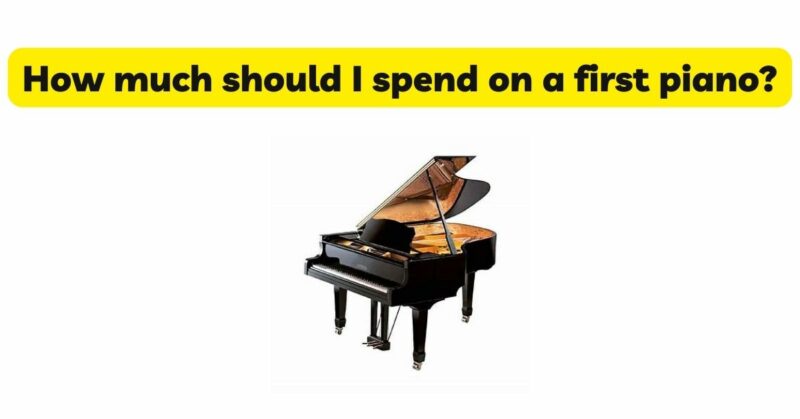Purchasing your first piano is an exciting milestone in your musical journey. As a beginner, you may wonder how much you should spend to ensure you have a quality instrument that supports your learning and growth. While it’s important to consider your budget, it’s equally crucial to invest in a piano that offers good playability, sound quality, and durability. This article aims to provide guidance on determining the appropriate amount to spend on your first piano, considering factors such as budget, quality, instrument type, and long-term value.
Assessing Your Budget:
Setting a budget for your first piano is an essential starting point. As a beginner, it’s reasonable to allocate a budget that aligns with your financial resources and commitment to learning. While it’s tempting to aim for the highest quality instrument available, it’s important to find a balance between affordability and quality.
Factors to Consider:
- Piano Type: The type of piano you choose will significantly impact its price. Acoustic pianos, such as upright or grand pianos, tend to be more expensive than digital pianos. Acoustic pianos offer an authentic playing experience and nuanced sound, while digital pianos provide versatility, portability, and affordability. Consider your preferences, available space, and budget to determine which type of piano is best suited for you.
- Quality and Playability: Quality and playability should be paramount considerations when purchasing your first piano. A piano with good construction, responsive keys, and a balanced tone will enhance your learning experience and help you develop proper technique and musicality. Ensure that the piano you choose provides a satisfying touch and sound that inspires you to practice and improve.
- Brand Reputation: Brand reputation can offer some assurance of the quality and reliability of your first piano. Established piano brands with a history of producing reliable instruments, such as Yamaha, Kawai, and Casio, are often recommended for beginners. These brands offer a range of models at different price points, allowing you to find a piano that suits your budget without compromising on quality. However, it’s important to note that lesser-known brands can also provide excellent options, so it’s worth considering those as well.
- Long-Term Value and Resale: While your first piano may not be a long-term investment, it’s worth considering its potential resale value or trade-in options if you decide to upgrade in the future. Choosing a reputable brand with a strong resale market can provide flexibility when the time comes to upgrade. This consideration becomes more relevant if you have long-term aspirations for your musical journey beyond the beginner level.
- Affordability and Available Options: Affordability is a significant factor when purchasing your first piano. Fortunately, there are numerous options available at various price ranges to suit different budgets. Digital pianos, in particular, offer a cost-effective solution, as they are generally more affordable compared to acoustic pianos. They can replicate the touch and sound of an acoustic piano while providing additional features such as headphone connectivity, built-in metronomes, and recording capabilities.
- Additional Considerations: Consider any additional features or accessories that may be important to you. For example, some digital pianos come with weighted keys to simulate the feel of an acoustic piano, while others offer connectivity options for computer or mobile devices. Assess your specific needs and preferences to determine which features are essential and worth investing in.
Conclusion:
Determining how much to spend on your first piano involves finding the right balance between affordability and quality. Set a budget that aligns with your financial resources and commitment to learning. Prioritize the quality, playability, and brand reputation of the piano, considering factors such as instrument type, long-term value, and available options. Remember that the most crucial aspect is your dedication to practice and learning. With careful consideration and research, you can find an appropriate and reliable first piano that will accompany you on your musical journey.


